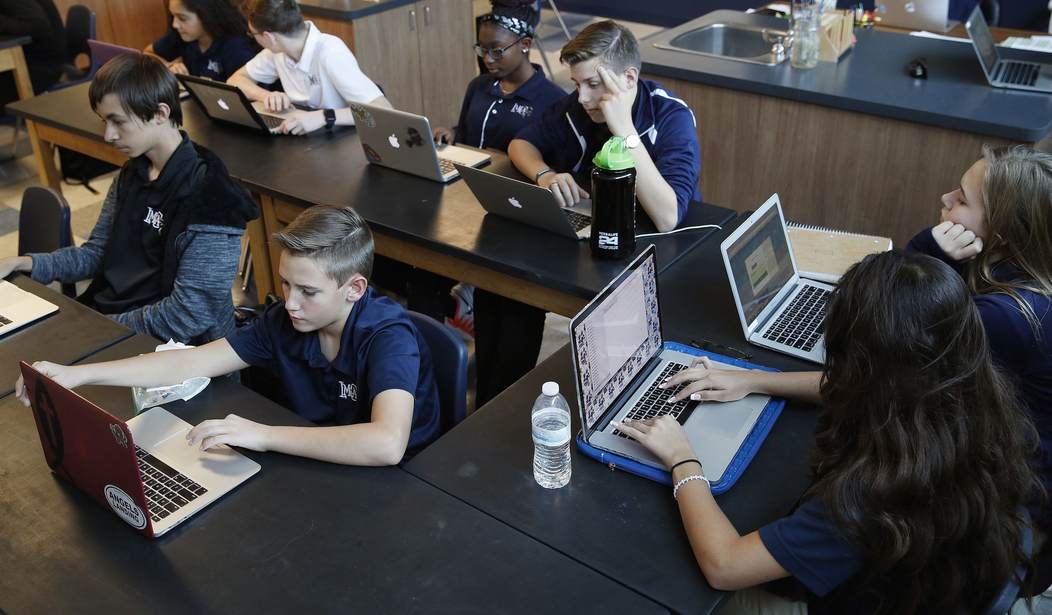(The opinions expressed in guest op-eds are those of the writer and do not necessarily represent the views of RedState.com.)
By Marc Ang
“Parents,” the new special interest group, tipped the recent Virginia election, surprising pundits. School choice gained major momentum after shutdowns, mandates, and parents being able to observe the compromised state of public education through Zoom sessions. RealClear opinion research polling showed 64 percent of Americans supporting school choice in April 2020, growing to 74 percent by June 2021. The biggest jumps in support were among Democrats.
Documenting this banner year for school choice is Corey DeAngelis, National Director of Research at the American Federation for Children, who I interviewed. He notes, “[Democrats] who had not previously thought much about educational options, or who didn’t feel all that positive before, realized, ‘Maybe it’s not a good idea to fund closed failing buildings, when we can fund the student directly instead.’”
As a community organizer and one of the official proponents of California’s “Educational Freedom Act”, I saw this on the ground as new grassroots leaders emerged due to Critical Race Theory and vaccine mandates. I was initially shocked last year when a far-left candidate won in a local conservative school district in Fullerton in 2020, simply because there was no opposition.
DeAngelis says in 2021, “19 states have enacted or expanded programs to fund students as opposed to systems. 15 states have pulled their funding, membership, or participation from the National School Board Association for labeling parents as ‘domestic terrorists.’ The number of states with education savings accounts programs doubled from five to 10. This is the gold standard of school choice and the purest form of funding the family directly.” California seeks to be #11.
Corey believes this has a better shot of passing than the failed gubernatorial recall, “The program benefits parents from all backgrounds. They can send their kids to the education provider that works best for them: public, private, charter, or a homeschooling option. I’m optimistic because even in California, there’s this new power dynamic unfolding. Parents are paying more attention and fighting harder than ever before.”
Homeschooling increased from five percent of our population to 11 percent after the pandemic, and numbers are sticking. “[People thought] families would return to the government schools, but we’ve seen a mass exodus of 1.5 million students, according to the latest federal data. [Meanwhile,] there’s a 7.1 percent increase in charter school enrollment, classified as public schools, but they’re not government-run. Virginia homeschooling numbers relative to pre-pandemic have increased by at least 40 percent. Parents like what they’re getting when formally home-educating their kids.”
A fifth of Arizona’s public school population are in public charter schools, compared to six percent nationwide. DeAngelis laments, “Arizona would’ve gotten further this year, if not for three House Republicans that blocked the largest proposed [school choice] expansion in Arizona history. It would’ve taken their existing Education Savings Account Program and tripled the amount of eligible students.”
West Virginia, which didn’t have any charter schools or private school choice programs in 2019, has now enacted the most expansive education savings account program in the country. In addition to funding following every child regardless of their income, money can “be used for special needs services and therapies, private tutoring, textbooks or other instructional materials. West Virginia essentially went from zero to 100.”
Other states have also made significant progress. New Hampshire’s House Education Committee passed a bill to expand their education freedom account program. Florida already instituted its largest statewide expansion of school choice in history. Yet their Senate Education Committee expanded eligibility and use of their Hope Scholarship program. Kentucky and Missouri instituted new private school choice programs in the form of education savings plans.
Marc Ang ([email protected]) is a community organizer in Southern California and the founder of Asian Industry B2B. Marc’s book “Minority Retort” will be released in early 2022.













Join the conversation as a VIP Member